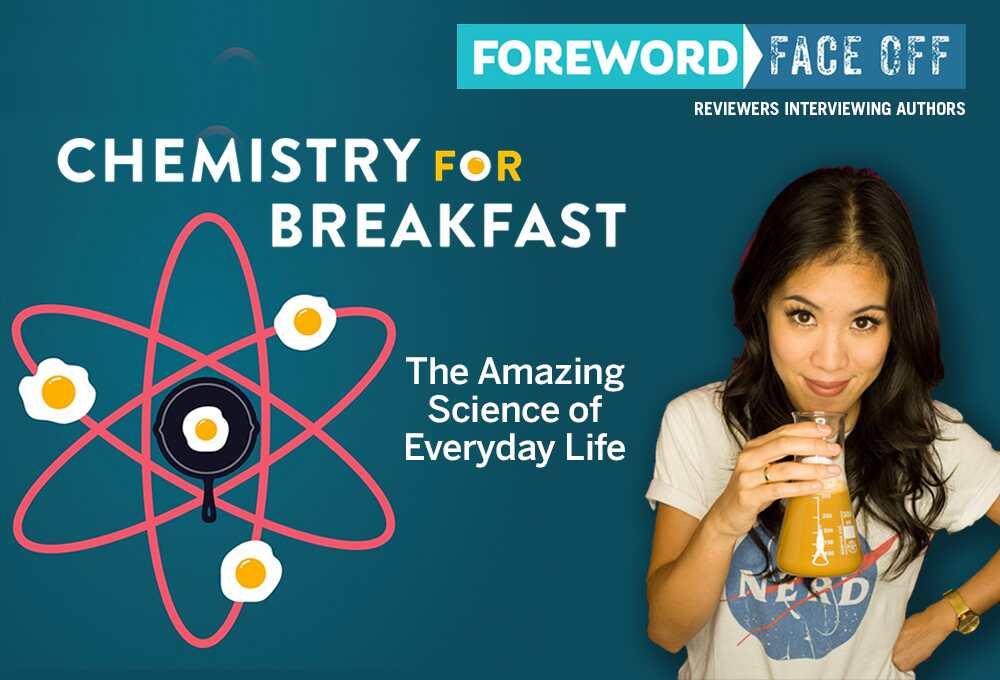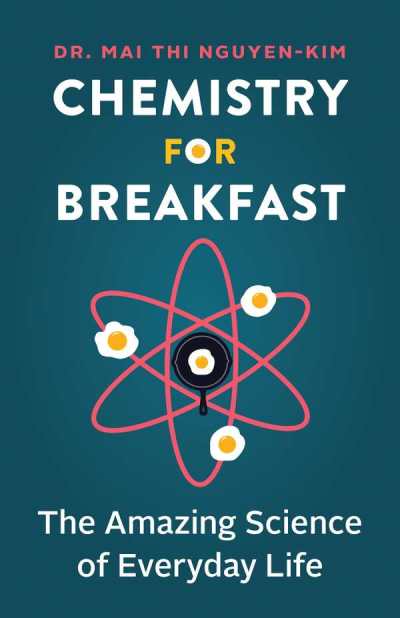Reviewer Melissa Wuske Interviews Mai Thi Nguyen-Kim, Author of Chemistry for Breakfast: The Amazing Science of Everyday Life

As ever more tech and innovation infiltrates our lives, in a sense, we grow dumber because there’s so much we don’t understand. But try we must. Whether it’s the molecular science behind cutting-edge COVID vaccines or the way your endocannabinoid system responds to the CBD product you’re using to sleep better, you will feel that much more comfortable and in control of your life if you make an effort to learn how things work.

And based on Melissa Wuske’s starred review, Dr. Mai Thi Nguyen-Kim’s Chemistry for Breakfast: The Amazing Science of Everyday Life offers a fantastic opportunity to make some headway in that direction.
With the help of Greystone Books, we connected Mai and Melissa for the following conversation about the “wondrous invisible world of molecules” that makes the world go round.
Some may not think that YouTube is a venue for serious scientific work. Your work proves them wrong. Why is it so important to present scientific work in places that are far from a sterile laboratory?
First of all, science should not be an exclusive club for academics. Scientific content should be accessible to everyone who’s interested, so it needs to be featured on as many platforms as possible. But I would even go further and argue that scientific content is especially crucial on platforms like YouTube. During the pandemic, YouTube has also become a hub for conspiracy theories and dangerous misinformation about COVID-19, spreading like a virus itself. This can only be tackled with reliable, well researched information. So I’m doing my best to represent.
Describe one of your latest chemistry explorations. What question started your investigation? What did you learn? What surprised you?
I left active research five years ago to become a full time science journalist. I don’t regret it, but I do miss the lab sometimes. I focused my PhD on drug delivery and tissue engineering; I used to design and synthesize materials that could work as transporting devices for drugs or as a scaffold for growing cells or tissue. I wanted to make novel therapeutics that would help people. I had the idealistic and naive dream to make the world a better place through my work. But I got frustrated at times, because research is slow and I became a specialist in a very narrow field, which just isn’t for me. Now, as I science journalist, I need to understand new topics every day. It’s challenging but very rewarding to me—and I can still help people by helping them understand the complexities of climate change or COVID-19.
Too often chemistry is taught in ways that turn people away from the ideas rather than draw them in. (I remember falling asleep in chemistry while my teacher dictated directions to an experiment that we had to write down.) What’s one way (even better if it’s simple!) that teachers can engage students more effectively in chemistry?
I’m not even mad at you! If I had only encountered chemistry in school I would have never become a chemist. Weirdly, it was complicated and boring at the same time. But I fell in love with chemistry through my dad, who’s also a chemist. He made me understand that everything is chemistry. It’s not just smoking beakers and explosions, but everyday life. We would stroll through pharmacies and he would explain the ingredients of shampoo or hair spray to me. Or he would stand in the kitchen, making his mouth-watering, signature peanut dipping sauce, explaining what makes a sauce thicken. He likes to say: “All chemists are great cooks.” Well, he sure is. “And if you can’t cook, then you’re not a good chemist.” So chemistry has always been like everyday knowledge to me. So maybe teachers need to find and transport all those everyday connections when teaching chemistry. At least that’s what I’m trying to do with my book.
Chemistry can be tough to visualize since so many of its components are hard to see. Your book presents vital comparisons and illustrations that help people see chemistry. What are some of your favorite analogies or visualizations to explain key ideas?
Understanding chemistry is like a key to an invisible world. As you read this, you are being bombarded by trillions and trillions of gas molecules that hail down on you at over 1000 mph. It’s those molecules that allow you to hear sound, as those molecules are pushed together and form waves. And you can only read these lines because electromagnetic waves hit sophisticatedly folded molecules on your retina that form protein receptors. So the first step to falling in love with chemistry is becoming aware of this wondrous invisible world of molecules that most of us are oblivious to. Once you open up to this experience, chemistry becomes very accessible and quite easy to visualize. And I promise, once you start reading my book, you’ll be surprised how easy it is to understand chemistry—and how easy it is to love it!
You have a love for chemistry that inspires others to curiosity and creativity. Who are some of the people who’ve inspired you?
Well, I already talked about my dad. Of course, he has been an important inspiration in my life. Today, my fans keep inspiring me everyday. In Germany, the book came out in 2018 and until the pandemic I went on a reading tour. My first question to the audience was “Wer hat Chemie abgewählt?” which means “Who dropped chemistry in school?” In Germany, you can drop chemistry in your senior high school years, and many do. Usually around half of my audience did. But they still came to a reading of a book that is a love letter to chemistry. They still bought and read it. And they ask wonderful and smart questions. It makes me so happy that people engage with chemistry in their free time, as a hobby, even though they hated it in school. This is always a huge motivation for me.
Due to COVID-19, more people are taking an interest in the ways science impacts people, like vaccine development and how much alcohol it takes to kill a virus. How has this renewed interest affected your work? What do you hope people will do next now that they’re interest in science is reinvigorated?
I’m not sure if the pandemic has been the best or the worst time for the public reception of science. Since last year, I have dedicated most of my work to COVID-19, explaining the science, but also arguing with politicians on TV talk shows. The pandemic has been the most successful time in my career, which is a strange feeling. My YouTube channel maiLab hit one million subscribers, I was awarded the Bundesverdienstkreuz by the German government, and Angela Merkel cited my words in the Bundestag. I do feel the pressure, but it’s amazing to have such an impact. But I’m also typically the bearer of bad news, when it comes to COVID-19. And some conspiracy theorists even paint me as some sort of puppet master conspiring with the Germany government to cash in on the vaccines or something along those lines. It’s crazy. I couldn’t go to a public event without personal security now. I try not to think too much about the hate, but focus on my work instead and use my platforms responsibly while it lasts. After the pandemic, science will return to becoming a niche topic, I think. But then I’ll have more time for fun things like chemistry.
Melissa Wuske
